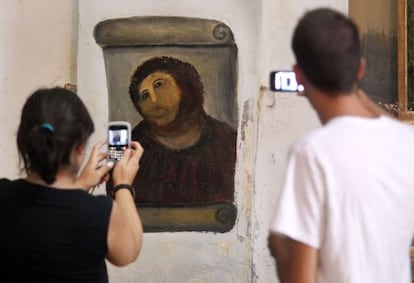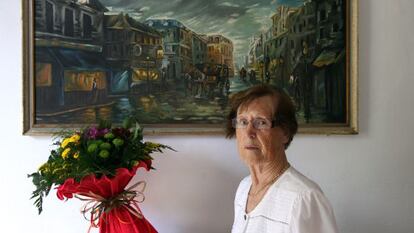'Ecce Homo' - the rubbish effect
An elderly lady's botched restoration has become the butt of silly season jokes The news story reveals the triumph of triviality in a cynical, juvenile world

Ever since journalism began, a summer news story has always come along to supply the laughter that readers want during what is known as the silly season. In the past, summers have generally lacked big news stories, and the vacation period has spawned all kinds of reports about Loch Ness monsters or lions on the loose to make up for the lack of other media bait.
The Great Crisis, with its ongoing overproduction of catastrophe, could have easily sufficed to fill the lean pages of the newspapers. But the public is sick to death of so much economic gloom, and a merry anecdote such as the rubbishy restoration of the Ecce Homo painting in a church in Borja, near Zaragoza, has won worldwide fame.
At the same time as this comic daub by the hand of an elderly, otherwise harmless church-going lady was discovered, millions of other events at least as funny have occurred all over the planet. The reason that this particular story has spread like wildfire on the internet, throughout 130 countries, is none other than the explosive effect of a rubbish-receptive system that treats a bestseller as a treasure, or an economic error as a nuclear explosion.
In short, it all depends on the same arbitrary whim of a world without moral or cultural order, and on its consequent capacity to turn a tiny hiccup into a general epidemic, with no sense of measure whatsoever.
Cecilia has produced an irreverent caricature of the son of God
The fact that an old granny is at the center of this story increases its interest. Today the young are a truly Lost Generation - lost, and impossible to find in any temple of wisdom. Lost in the crisis, and discredited as an alternative to almost anything. Now, unexpectedly, it is the old who catch our attention as alternatives. Probably they know no better than the young, but the patent inefficiency of the younger generation enhances their visibility.
The case of Cecilia Gim¨¦nez - the humble Aragonese painter whose audacity has inflicted terminal damage on the already tortured Ecce Homo painted in the 19th century by a mediocre local artist - has no artistic importance whatsoever. What is meaningful about the massive celebrity she has attained on the social networks, and everywhere from Le Monde to the website of The New York Times, is the triumph of the banal within the sublime.
The good Cecilia's aim of embellishing a Christ deteriorated by humidity and salt residue has miraculously produced an irreverent caricature of the son of God, a face uglier than sin.
Blasphemy? Blasphemy has lost social relevance, though it still serves the Church for histrionic exclamations of scandal. The internet, as general patron of the new and strange value of things, is the new God, with no religion at all. All blasphemers, from the pop star Madonna to the man who boils a crucifix, are necessarily religious. They harbor the intention of profaning, because they still believe. The internet is neither God nor Antichrist. It binds people together without religion.
The internet brings to the fore a type of individual who, after the consumer culture has become not an infantile person, but, above all, a cynical one. The infant - the infans - is so called because he is presumed not to speak. But the being that appears on the internet is above all else loquacious, expressive and garrulous. The internet feels vibrant, yes, but also deafening and buzzing.
Copyright? It hardly seems to apply to the present case. Every copy, and all the more so the worse it is, reveals the weaknesses of the venerated original.
The new human type that will derive from the internet, having been intensely trained in the consumer culture and in the practice of copying, will probably be more cynical, more ironic and, at the same time, more universally urban. The internet doesn't only net us: it undoes scale and hierarchy at the same time.
"I wanted to finish it, but they wouldn't let me," says painter

Since the controversy erupted last Tuesday about her peculiar restoration of an Ecce Homo painting in a church in the town of Borja, Zaragoza, Cecilia Gim¨¦nez, 81, has been overwhelmed by the national and international media attention her actions have received. A couple of Civil Guard vans were sat outside her house at the end of last week, and she has even needed medical attention to calm her nerves. Last Friday, though, she received a bright and colorful bunch of flowers and an affectionate message as a show of support. "My local fans brought me this," Cecilia says, somewhat shyly, by the door of her house.
An amateur painter and devoted mother to a 53-year-old disabled son, who is unable to manage on his own, she apologizes for her actions. "I can only say what I did. But as we painters always do, we first apply a brushstroke to everything and then carry on painting."
Cecilia's misfortune was to then go on vacation for two weeks just after the "brushstroke." "I left it like that thinking I would finish it when I came back, but when I came there was already trouble and they wouldn't let me finish it," she explains.
Cecilia nevertheless has the town on her side. "A guy from the town hall, who gave me a kiss to cheer me up, told me to stay home tomorrow as they were going to bring some flowers or something. But no, I don't want them to do anything," she says humbly.
Her sister Mar¨ªa Gim¨¦nez is also tired of the mockery that has resulted from the restoration. "They say they are selling t-shirts with the face of [Spanish celebrity] Paquirr¨ªn on the internet... What do you want me to say? I think that is blasphemous."
Mar¨ªa says the Ecce Homo restoration is not the first retouch job her sister has done in a local church. "Years ago my sister and I restored the side chapel in the Santa Clara church in Borja with gold leaf because the nuns asked us to. What's more, she had restored this painting four years ago, and that summer the artist's granddaughter came and she didn't even realize that it had been retouched. What happened is that this time they didn't let her finish," she explains.
The tourists enter and leave the Santuario de Misericordia church in Borja with poker faces and cellphones in hand, ready to take a picture next to the painting. "We saw it on the news, but we had never been in the church before," says a woman from neighboring Soria province. Many come and go, but it's the local residents who stay, and ask: "How long will this go on for?"
Tu suscripci¨®n se est¨¢ usando en otro dispositivo
?Quieres a?adir otro usuario a tu suscripci¨®n?
Si contin¨²as leyendo en este dispositivo, no se podr¨¢ leer en el otro.
FlechaTu suscripci¨®n se est¨¢ usando en otro dispositivo y solo puedes acceder a EL PA?S desde un dispositivo a la vez.
Si quieres compartir tu cuenta, cambia tu suscripci¨®n a la modalidad Premium, as¨ª podr¨¢s a?adir otro usuario. Cada uno acceder¨¢ con su propia cuenta de email, lo que os permitir¨¢ personalizar vuestra experiencia en EL PA?S.
?Tienes una suscripci¨®n de empresa? Accede aqu¨ª para contratar m¨¢s cuentas.
En el caso de no saber qui¨¦n est¨¢ usando tu cuenta, te recomendamos cambiar tu contrase?a aqu¨ª.
Si decides continuar compartiendo tu cuenta, este mensaje se mostrar¨¢ en tu dispositivo y en el de la otra persona que est¨¢ usando tu cuenta de forma indefinida, afectando a tu experiencia de lectura. Puedes consultar aqu¨ª los t¨¦rminos y condiciones de la suscripci¨®n digital.








































